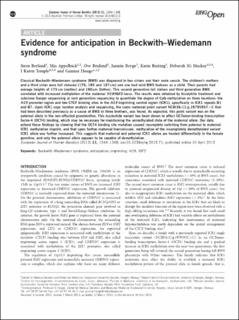| dc.contributor.author | Berland, Siren | |
| dc.contributor.author | Appelbäck, Mia Sanby | |
| dc.contributor.author | Bruland, Ove | |
| dc.contributor.author | Beygo, Jasmin | |
| dc.contributor.author | Buiting, Karin | |
| dc.contributor.author | Mackay, Deborah J.G. | |
| dc.contributor.author | Temple, I. Karen | |
| dc.contributor.author | Houge, Gunnar | |
| dc.date.accessioned | 2022-10-13T07:22:33Z | |
| dc.date.available | 2022-10-13T07:22:33Z | |
| dc.date.created | 2014-01-21T12:13:47Z | |
| dc.date.issued | 2013 | |
| dc.identifier.issn | 1018-4813 | |
| dc.identifier.uri | https://hdl.handle.net/11250/3025756 | |
| dc.description.abstract | Classical Beckwith–Wiedemann syndrome (BWS) was diagnosed in two sisters and their male cousin. The children’s mothers and a third sister were tall statured (178, 185 and 187 cm) and one had mild BWS features as a child. Their parents had average heights of 173 cm (mother) and 180 cm (father). This second generation tall stature and third generation BWS correlated with increased methylation of the maternal H19/IGF2-locus. The results were obtained by bisulphite treatment and subclone Sanger sequencing or next generation sequencing to quantitate the degree of CpG-methylation on three locations: the H19 promoter region and two CTCF binding sites in the H19 imprinting control region (ICR1), specifically in ICR1 repeats B1 and B7. Upon ICR1 copy number analysis and sequencing, the same maternal point variant NCBI36:11:g.1979595T>C that had been described previously as a cause of BWS in three brothers, was found. As expected, this point variant was on the paternal allele in the non-affected grandmother. This nucleotide variant has been shown to affect OCTamer-binding transcription factor-4 (OCT4) binding, which may be necessary for maintaining the unmethylated state of the maternal allele. Our data extend these findings by showing that the OCT4 binding site mutation caused incomplete switching from paternal to maternal ICR1 methylation imprint, and that upon further maternal transmission, methylation of the incompletely demethylated variant ICR1 allele was further increased. This suggests that maternal and paternal ICR1 alleles are treated differentially in the female germline, and only the paternal allele appears to be capable of demethylation. | en_US |
| dc.language.iso | eng | en_US |
| dc.publisher | Macmillan | en_US |
| dc.rights | Navngivelse 4.0 Internasjonal | * |
| dc.rights.uri | http://creativecommons.org/licenses/by/4.0/deed.no | * |
| dc.title | Evidence for anticipation in Beckwith-Wiedemann syndrome | en_US |
| dc.type | Journal article | en_US |
| dc.type | Peer reviewed | en_US |
| dc.description.version | publishedVersion | en_US |
| dc.rights.holder | Copyright 2013 Macmillan Publishers Limited | en_US |
| cristin.ispublished | true | |
| cristin.fulltext | original | |
| cristin.qualitycode | 1 | |
| dc.identifier.doi | 10.1038/ejhg.2013.71 | |
| dc.identifier.cristin | 1096143 | |
| dc.source.journal | European Journal of Human Genetics | en_US |
| dc.source.pagenumber | 1344-1348 | en_US |
| dc.subject.nsi | VDP::Medisinsk genetikk: 714 | en_US |
| dc.subject.nsi | VDP::Medical genetics: 714 | en_US |
| dc.identifier.citation | European Journal of Human Genetics. 2013, 21 (12), 1344-1348. | en_US |
| dc.source.volume | 21 | en_US |
| dc.source.issue | 12 | en_US |

